

Murder and torture 'carried out by both sides' of uprising against Libyan regime. Rebels as well as pro-Gaddafi forces have perpetrated killings, torture and other abuses during the uprising against the Libyan regime, say human rights investigators.

The civil war that brought down Muammar Gaddafi has been marked by widespread atrocities on both sides, according to Amnesty International. Khalifa Hiftar, the ex-general leading a revolt in Libya, spent years in exile in Northern Virginia. Two weeks before he masterminded an assault on two major Libyan cities, Khalifa Hifter hosted a dinner to court a potential ally.
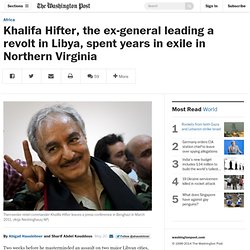
Hifter was normally a confident man, a former general who had gone on to spend years in Northern Virginia as an exiled opposition leader before returning home for the 2011 Libyan revolution. But that night he seemed unsteady. Libya. Gaddafi: The Endgame. South Korea ferry tragedy death toll rises#link# army convoy attacked in Peshawar#link# cuts whaling targets after UN ruling#link# guides killed as avalanche hits Everest#link# sentences anti-corruption activists#link# frees jailed Palestinian journalist#link# Denied: Palestinians decry detention#link# hit the right notes in Gaza#link# searched for abducted Nigerian girls#link# civilians in danger as deal breaks down#link# Bouteflika poised to win elections#link# discover Earth-like planet#link# apologises for S Korea ferry disaster#link# deal reached on Ukraine crisis#link# states agree deal to end Qatar tensions#link#

How Britain courted, armed and trained a Libyan monster. New Libya ’stained’ by detainee abuse. Libya Rebels Focus Wrath on African Migrants. CIA worked with Libya in terror suspect renditions, documents show. The CIA worked closely with Muammar Gaddafi's intelligence services in the rendition of terrorist suspects including Abdel-Hakim Belhaj, the rebel commander in Tripoli, according to documents found in Tripoli.

The documents, found in the offices of the former head of Libyan intelligence Musa Kusa, also show that MI6 gave Gaddafi's regime information on Libyan dissidents living in the UK. The files, uncovered by Human Rights Watch, provide details of the close relationship between western intelligence services, including MI6 and the CIA, and the ousted dictator's regime. Two documents from March 2004 appear to be American correspondence to Libyan officials to arrange the rendition of Belhaj, the former leader of the Libyan Islamic Fighting Group, a now-dissolved militant group with links to al-Qaida. Referring to him by his nom de guerre, Abdullah al-Sadiq, the documents say he will be flown from Kuala Lumpur, Malaysia, to Libya, and asks for Libyan government agents to accompany him. Libya rebel commander contends was tortured, rendered by CIA.
Libyan rebel Tripoli military commander Abdel Hakim Belhaj in Tripoli Aug. 31, 2011.
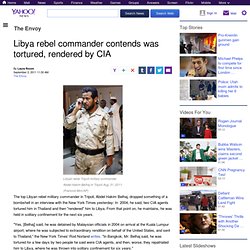
(Francois Mori/AP) The top Libyan rebel military commander in Tripoli, Abdel Hakim Belhaj, dropped something of a bombshell in an interview with the New York Times yesterday: In 2004, he said, two CIA agents tortured him in Thailand and then "rendered" him to Libya. From that point on, he maintains, he was held in solitary confinement for the next six years. "Yes, [Belhaj] said, he was detained by Malaysian officials in 2004 on arrival at the Kuala Lumpur airport, where he was subjected to extraordinary rendition on behalf of the United States, and sent to Thailand," the New York Times' Rod Norland writes. "In Bangkok, Mr. Now, Belhaj heads the Libyan rebels' military committee for restoring order in the capital of Tripoli. Libya rebel commander plays down Islamist past. Abdel-Hakim Belhaj is an emerging hero of the Libyan uprising, the man who led the Tripoli Brigade that swept into the capital and captured the fortified compound that was Muammar Qaddafi’s seat of power.
He’s also the former leader of an Islamic militant group who says he was tortured by CIA agents at a secret prison. Belhaj, the rebels’ commander in Tripoli, said Friday that the US wrongly lumped him in with terrorists after September 11, but that he holds no grudge. He said he shares the West’s goal of a free Libya. “We call and hope for a civil country that is ruled by the law which we were not allowed to enjoy under Qaddafi,” he told The Associated Press.
“The identity of the country will be left up to the people to choose.” Jim Cowie: The Battle for Tripoli's Internet. As dawn broke in Libya on the morning of Sunday 21, August, it appeared that the battle for control of Tripoli was underway.

Throughout the night, a steady stream of tweets and retweets emerged from Libyan sources, painting a confusing, often contradictory picture of the evolving situation. Renesys is still piecing together the data that can confirm or deny much of what was reported through the course of the day Sunday, but one thing is clear: something very strange was going on with Tripoli residents' Internet access. Service was restored suddenly in Tripoli, flickered on and off for a couple of hours, and then died, with the majority of the country's international BGP routes withdrawn from service for good measure. What's Happening in Libya Explained. LIBYA’S ‘FOSSIL WATER’ « spectre footnotes. The headless corpse, the mass grave and worrying questions about Libya's rebel army. Since the bodies were seen by the Daily Telegraph attempts to discover their identities have been unsuccessful, in part because of obstruction by rebel authorities in the area.
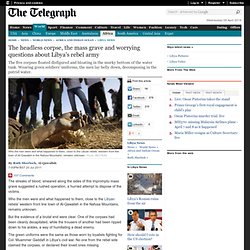
Having highlighted the discovery to those authorities the area was subsequently bulldozed and the bodies dissappeared. The find will add to concerns highlighted in recent days over human rights violations by rebel forces. Human Rights Watch last week said that had looted homes, shops and hospitals and beaten captives as they advanced. Migrant who survived Gaddafi's torture machine breaks silence on pushbacks - Malta Independent Online. Pro-regime troops seen 'wearing gas masks in Misurata'
Libyan government officials inspect the site of a NATO missile strike that killed Gaddafi’s youngest son and three grandchildren and wounded friends and relatives, in Tripoli, yesterday. The photo was taken on a tour organised by the Gaddafi government. Photo: Darko Bandic Pro-Gaddaffi forces have been seen roaming the streets of Misurata wearing gas masks, contacts in Libya's besieged city have reported to timesofmalta.com . Sources at the hospital confirmed that pro regime troops were wearing gas masks. An independent source said there were reports that thousands of gas masks had been distributed to troops yesterday.
The debate on the Left re US intervention in Libya. Alon Ben-Meir: Gaddafi: Survival Is Not an Option. President Obama has already developed a reputation for tough talk and little action.

Libyan Liberation Movement Strikes Back as NATO Comes to the Rescue. The leadership of the United Nations-authorized No-Fly Zone over Libya will pass from the US to the 28 nations of NATO, after an agreement was hammered out with skeptics such as Turkey and Germany.
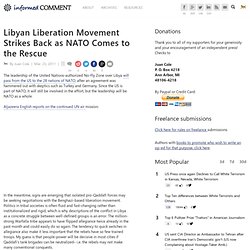
Since the US is part of NATO, it will still be involved in the effort, but the leadership will be NATO as a whole. Aljazeera English reports on the continued UN air mission: In the meantime, signs are emerging that isolated pro-Qaddafi forces may be seeking negotiations with the Benghazi-based liberation movement. Politics in tribal societies is often fluid and fast-changing rather than institutionalized and rigid, which is why descriptions of the conflict in Libya as a concrete struggle between well-defined groups is an error. Top Ten Accomplishments of the UN No-Fly Zone. 1.
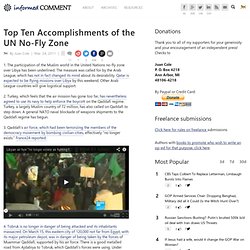
The participation of the Muslim world in the United Nations no-fly zone over Libya has been underlined. The measure was called for by the Arab League, which has not in fact changed its mind about its desirability. Qatar is expected to be flying missions over Libya by this weekend. Other Arab League countries will give logistical support. 2. 3. 4. An Open Letter to the Left on Libya. As I expected, now that Qaddafi’s advantage in armor and heavy weapons is being neutralized by the UN allies’ air campaign, the liberation movement is regaining lost territory. Liberators took back Ajdabiya and Brega (Marsa al-Burayqa), key oil towns, on Saturday into Sunday morning, and seemed set to head further West. This rapid advance is almost certainly made possible in part by the hatred of Qaddafi among the majority of the people of these cities.
The Buraiqa Basin contains much of Libya’s oil wealth, and the Transitional Government in Benghazi will soon again control 80 percent of this resource, an advantage in their struggle with Qaddafi. I am unabashedly cheering the liberation movement on, and glad that the UNSC-authorized intervention has saved them from being crushed. I can still remember when I was a teenager how disappointed I was that Soviet tanks were allowed to put down the Prague Spring and extirpate socialism with a human face. 1. 2. 3. Libyan Woman Struggles to Speak to Journalists and Is Dragged Off.
Moises Saman for The New York Times A foreign journalist, right, tried to prevent a government minder from removing Eman al-Obeidy from the Rixos Hotel in Tripoli. “They say that we are all Libyans and we are one people,” said the woman, who gave her name as Eman al-Obeidy, barging in during breakfast at the hotel dining room. “But look at what the Qaddafi men did to me.” She displayed a broad bruise on her face, a large scar on her upper thigh, several narrow and deep scratch marks lower on her leg, and marks from binding around her hands and feet.
She said she had been raped by 15 men. She pleaded for friends she said were still in custody. Libya conflict: MPs voice unease over military action. Libya: If they are mercenaries, it's not "civil war." Report that Israeli company helping recruit. The latest media attempt to portray the Libyan revolution as devolving into "civil war" misses an important point: if one side is mercenaries, it's not a civil war. A civil war is two opposing sides of countrymen of roughly equal conviction and strength. But evidence is emerging that without his hired army of outsiders from other countries, mostly sub-Saharan Africa, who are paid the astonishing sum in their own countries of $200 a day, the remainder of Gaddafi's regime would fold like a house of cards. News reports persist in calling Gaddafi forces "loyalists" even though Gaddafi now has a record of shooting anyone he decides isn't "loyal," such as pilots who refused to drop bombs on protesters.
Libyans Defy Media Censorship - Now that Libya is fighting its own revolution, Muammar Gaddafi seems to have been looking to the experiences of nearby dictators to help him desperately cling to power. Following Hosni Mubarak’s lead, Gaddafi shut off the Internet for several days, and television and cell phone signals even now continue to be jammed. This has made it difficult to get news and information outside of Libya -- especially about Tripoli, where Gadaffi is making his last stand.
Understanding Libya's Michael Corleone - An Interview with Benjamin Barber. As a longtime advisor to Saif al-Qaddafi, Benjamin Barber knows him just about as well as any Western intellectual. Barber -- president of the CivWorld think tank, distinguished senior fellow at the Demos think tank, and author of Strong Democracy and Jihad vs. McWorld -- was among a small group of democracy advocates and public intellectuals, including Joseph Nye, Anthony Giddens, Francis Fukuyama, and Robert Putnam, working under contract with the Monitor Group consulting firm to interact with Col.
Muammar al-Qaddafi on issues of democracy and civil society and to help his son Saif implement democratic reforms and author a more representative constitution for Libya. It's all gone horribly wrong. But in this interview, Barber argues that his intentions were responsible, tries to understand Saif's remarkable about-face, and worries for the future of Libya and the young man he knew well.
Foreign Policy: How is it that so many people got Saif al-Qaddafi so wrong? Crackdown. Please support our site by enabling javascript to view ads. Obama and Libya: Not 'why', but 'how' Obama's Secret Support of Libyan Rebels Just Got Very Public - Global. Libya: Stop the Crackdown. TURKEY TO LIBYA: FREE IMAN! SEND HELP TO LIBYA!!! Petition.